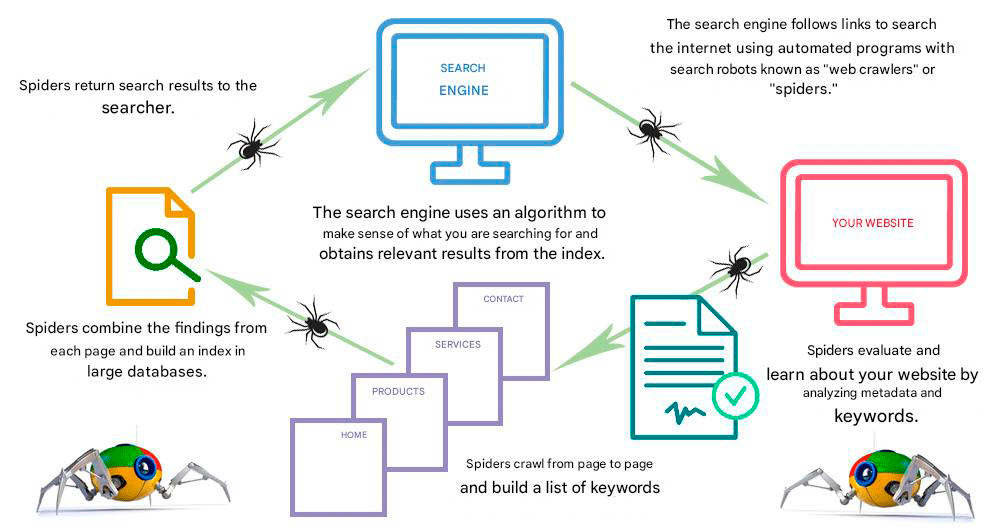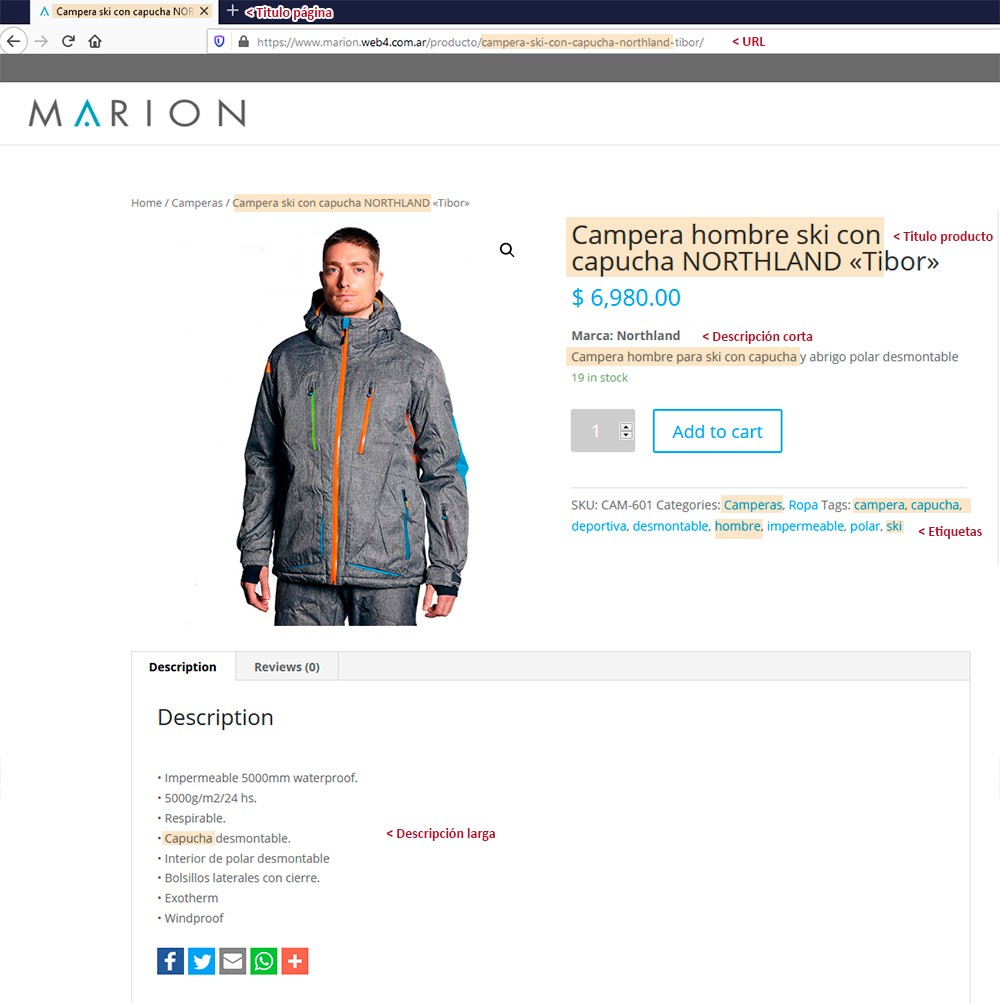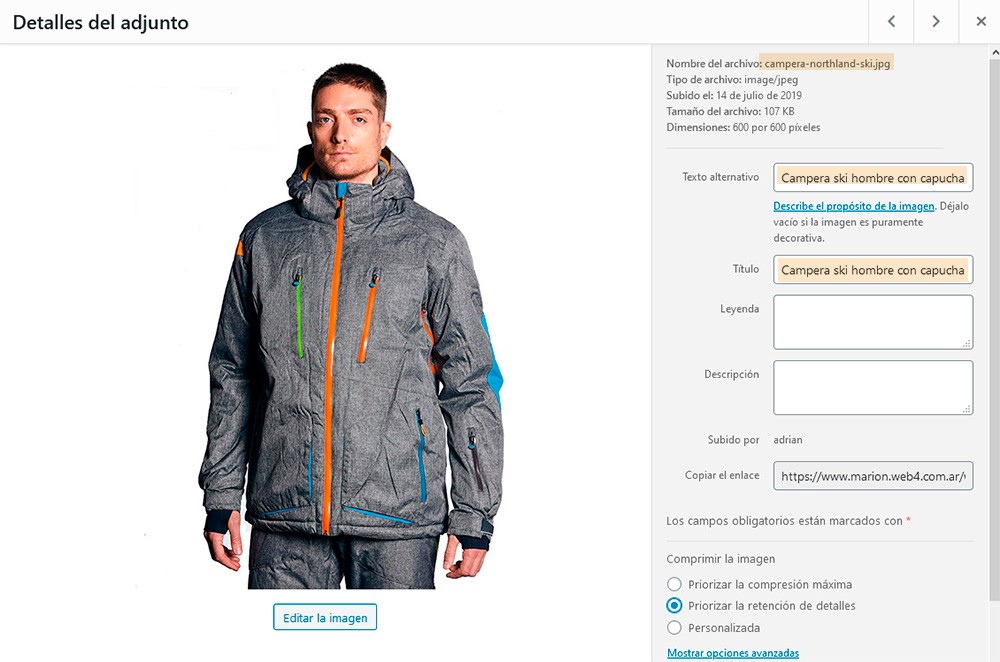How to improve SEO on your website
In this article I will give you some suggestions on how to improve SEO on your website.
I am going to show you how search engines like Google work so that you understand why it is so important that your content meets the basic SEO requirements.
Although SEO implies a very meticulous work and must be carried out by experts, the idea of this article is only to give you some basic concepts so that you can have an acceptable performance for your website or your online store.
The concepts shown here are based on the use of the WordPrefect plugin Yoast SEO in its free version.
What is SEO?
SEO is the acronym for Search Engine Optimization and consists of a series of "textual" requirements that search engines like Google requires that your content be indexed and found on the web.
These requirements help improve your search engine positioning and the more accurate they are, the greater your chances of appearing in the results.
SEO is an “additional” process to web design, through which aspects of the content of a page are modified, to improve its visibility in search engine results.
Therefore, it is very important that you approach SEO-oriented work from the beginning and take it as a general rule for all your startups on the web.
It is very counterproductive to do it after the publication of the site, in addition to representing a double job and a double budget.
In recent years, SEO has been one of the most valuable practices in web marketing, due to the contributions it generates to the traffic of a web page.
This contribution, depending on the intention of the page, can translate into more sales , more opportunities, more publicity, greater dissemination of content, etc.
If you intend to get advertising advertisers for your website, you must make sure you do a good SEO and that your website is very well ranked and gets many visits.
Otherwise no one is going to invest money in a little visited website.
So you should never do without SEO!
How do search engines work?
Whether you have a corporate website or an online store, you have to understand that each page represents a fundamental element to improve SEO.
Search engines have two main functions: searching the web and building indexes.
With this you They provide answers through a relevance calculation and thus show you optimal results.
A search engine consists of four basic parts:
- A user interface to make search requests (for example, the Google website)
- A robot or spider that searches for information on the Internet
- An algorithm that connects user requests to the database.
- A database where all content has been indexed
The heart of any search engine is undoubtedly the algorithm that directs the robot or spider and then categorizes the information that will be displayed after user requests.
The "spideries"
Google sends some tracking robots or spiders, which we call “spiderlings”, which periodically analyze your website looking for variations in the content.
These variations add value to your positioning, since if the robots pass continuously for your website and do not register new content, Google will consider it as not very relevant and your positioning will not be good.
I advise you to periodically update the contents of your website by adding new sections and new products if you have an online store.
Having a news blog with topics related to your activity is highly valued by Google as it contributes Relevant content and favors the traffic of your website.
But I advise you that the content is your own and not copied from other sites, since it can be considered duplicate content and can be penalized.
Therefore, you should be concerned that the information on your website is relevant to improve your positioning and make it easier for your customers to find you.
Establishing communication priorities
Search engines first read the URL of the page (www.yourcompany.com), then the title of each page, then the subtitles of the content and finally the texts and images of your pages.
All these elements must be strategically and with logical criteria in view of improving SEO.
Each article on your website or online store constitutes a new independent page and you should make the most of it.
Each page allows you to create a "target keyword phrase" that defines the content of the page.
This phrase should contain no more than 5 words, the keywords for which a user would search for you on the web, and should be as specific as possible, avoiding generic phrases that would yield many results.
If you have an online store, they must also appear in the title of the product, since as I said before, it is the first thing that search engines read.
These keywords must also appear in the descriptive text of the products and in the metadata of the images.
Do we see an example?
I am going to graph it with a concrete example of a product in an online store, but it is valid for any type of website.
The product is a Nothland brand men's jacket.
An objective keyword phrase that describes the product could be “gray hooded jacket” , but that description would return hundreds of search results.
So we need a more narrow phrase. How about we try something more specific?
“northland men's ski jacket with hood”
Here we are giving 5 basic concepts that could be of interest to the customer who is looking for a specific product:
First we define the product (jacket), then the user (man , women, children), then the specific use or material (ski , sports, dress, raincoat), then we clarify that it has a hood, and finally the brand (Northland)
Those 5 words are filtering us and narrowing down a lot of results that we are not interested in and that favor our products to show up in better positions.
The product title (and the page) should contain this key phrase, preferably at the beginning.
The title can be longer: Northland men's ski jacket with hood, Tibor waterproof model with zippers, but we make sure it contains the key phrase.
The key phrase, or any of its words, must also be repeated in the descriptive texts and will favor web positioning.
SEO in images
Although the meta description does not influence the web positioning, it allows highlighting the search keywords, improving the CCR (number of times a keyword appears).
As I said in my previous article Requirements to have an online store , it is very important how the JPG image files are named, they must be descriptive and contain the key phrase to improve their indexing.
So I repeat, never leave the default name as it comes from the camera (eg pic0024585.jpg )
Optimizing image attributes
The images of your website are saved in the WordPress Media Library that allows you to configure their attributes.
Completing these fields creates HTML tags that favor SEO.
Image title: Normally it takes it by default from the name of the image file, and that is why before I told you not to neglect this file title.
It is advisable to create the files from image with the final SEO-oriented titles containing the keywords that we want to position.
Anyway, it can be optimized in the WordPress library image editor
Alternative text: It is very important for SEO and is necessary for people with visual disabilities (the browser plays an audio with the text). It must be descriptive of the image and try to include the keywords, but without abusing, they should not be in ALL the images on the same page.
The Legend and Description fields are additional information that is not superfluous to implement. Although they do not generate positioning, all the added value information is always valuable.
Final conclusion
We all know that Google is the one who imposes the rules of the game on the Internet, and that the success of our website or online store depends on being found in their search engines, and being chosen among our competitors.
If you want to be part of the game, you must understand and accept the regulations and requirements that your website must have.
Otherwise you will be left out, no matter how attractive your website is or how good the products you are trying to sell online are.
I hope you enjoyed this article and that it was useful to you.
If you wanted to have your own website and you consider that I am a suitable professional, do not hesitate to contact me and I will gladly advise you.
In the Related Articles section below, you will find many articles with specific topics that complement the one you just read. Thank you!




